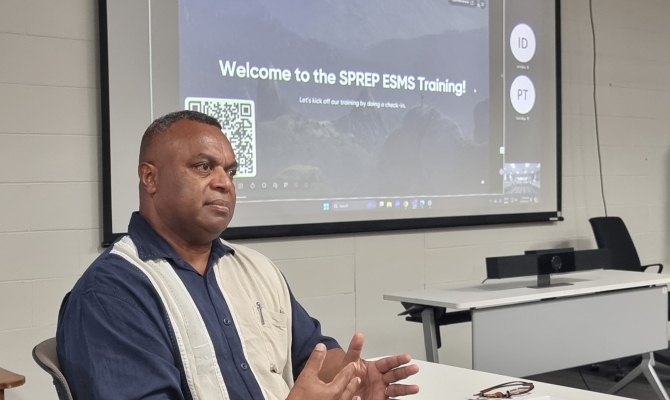
27 June 2024, Apia Samoa - As Pacific communities face increasingly complex environmental challenges, the Secretariat of the Pacific Regional Environment Programme (SPREP) is taking proactive steps to ensure its projects and interventions meet the highest standards of environmental and social responsibility.
On 12 June 2024, SPREP conducted an in-house training for staff on its Environmental and Social Management System (ESMS), to enhance the organisation’s capacity to implement robust environmental and social safeguards across its expanding portfolio of regional projects.
The training, jointly organised by the Environmental Monitoring and Governance (EMG) Programme and the Project Coordination Unit (PCU), brought together staff members from various SPREP programmes and departments interested in expanding their understanding of Safeguards and ESMS.
The region is at a crossroads of development and environmental preservation which is reflected in growing in scale and complexity of projects implemented by SPREP, from climate resilience initiatives to biodiversity conservation efforts. With this growth comes a greater responsibility to ensure our work positively impacts both the environment and local communities.
In direct response to this, SPREP developed an ESMS in 2016 which supports Regional Goal 4 of the SPREP 2017 – 2026 Strategic Plan to ensure “Pacific people and their environment benefit from commitment of environmental governance”. The policy was reviewed and updated in 2019 and now consist of policies, standards as well as procedural guidance on how to effectively operationalize the system for projects developed, implemented and/or executed by SPREP.
SPREP’s Director for EMG, Mr. Jope Davetanivalu, highlighted the importance of SPREP’s Environmental and Social Management System.
"Our ESMS is more than just a policy document – it's a living system that evolves with the changing landscape of environmental challenges in the Pacific,” said Mr Davetanivalu. “This training is about bringing that system to life in our day-to-day operations."

The training led by Mr. Puta Tofinga and Mr Ivan Diarra from the EMG programme and Mr Rupeni Mario of the PCU covered a range of crucial topics including the introduction to Environmental and Social Safeguards (ESS) and their relevance in the Pacific context, detailed overview of SPREP's ESMS, including its review and 2019 update and a step-by-step guide to the SPREP ESS procedure including the roles and responsibilities.
The training also covered case studies from SPREP's diverse project portfolio and involved interactive discussions on challenges and best practices in implementing safeguards.
A significant portion of the session was dedicated to addressing the unique challenges of implementing safeguards in Pacific Island contexts. Participants shared experiences and brainstormed solutions to issues such as limited resources, geographical isolation, and diverse cultural considerations.
"This training has not only enhanced our technical knowledge but also fostered a shared understanding of how safeguards contribute to the overall success and sustainability of our projects," Mr. Tofinga commented.
The training comes at a critical time, as SPREP oversees an unprecedented number of regional projects, with complex interventions such as infrastructure development and land use changes, heightening the need for careful consideration of environmental and social impacts.
As environmental challenges continue to pose existential threats to Pacific Island communities, SPREP's enhanced capacity to implement rigorous safeguards ensures that its projects not only address immediate environmental concerns but also contribute to the long-term resilience and sustainability of the region.
For more information on the SPREP ESMS or safeguards management at SPREP, contact Mr Jope Davetanivalu ([email protected]), Mr Rupeni Mario ([email protected]) or Mr Puta Tofinga ([email protected]).